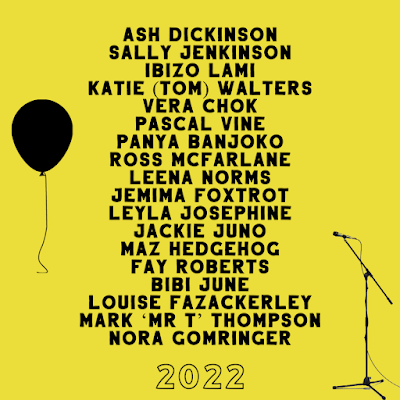Well. Bloody hell. That's it -
I'm done for the year! :) What am I going to do with myself?!
If it plays out like the last couple of years, I'm probably going to spend the next couple of weeks still writing new poems virtually daily, as the momentum and discipline (and reduction of self-doubt and pre-editing) persists but I'll also start going back to edit, trim, and - in the case of the performable pieces - learn what I've written this month.
Since I also had 2½ days of
Poetry To Go in the mix, plus a wedding commission piece to write, I will have written more like 45 poems this month, which was an epic achievement, I guess, but did make things a little harder. Turns out creative energy can be quite finite, especially when you're trying to administrate it - poetry admin cramps poetry writing (and possible vice versa). I'll try to remember that. (Handling major, seismic shifts in my day job wasn't particularly conducive to mental energy either!)
Some other observations about my output this year:
1. More (end-)rhyming than usual.
Not only the now-traditional
triolet,
terzanelle, and
sonnet from me, but also
clerihews,
limericks, and other comedic iambic pentameter end-rhyme (one about
perennial enemies, another about an
imaginary political candidate encounter, and a
seasonal one).
2. More comedy
But only in rhyme. It would appear that, when I try to be funny, I feel the urge to go tumpty-tumpty, ABAB.
3. More darkness
There were some seriously dark imagery coming out in places - the aforementioned
imaginary right-wing encounter was pretty violent, the other explicitly
politically-themed one was sinister, and there was plenty of interpersonal tension depicted -
here,
here,
here,
here, and
here. Also the
plea to a friend who'd been threatening suicide online that I didn't have to send, after all.
4. Resolution
However, there were lots of "Je ne regret rien" and even happy/ practical resolutions. One of them
explicitly inspired by the fun of turning forty this year, and others depicting
care-free days and the will to
live my own life, unjudged by (and unjudging of) other people's preferences.
5. Welsh
Again, as per tradition, poems cropped up that referenced my heritage and upbringing. This time, however, it was in the form of my one
concrete poem, and playing a
new form (for me).
6. Conforming
I tend to write free verse; it's just a preference, and I have nothing against rhyming and syllable-bound forms at all, it's just that, to me, it's more obvious when it's done wrong. (And yes, you can have rubbish free verse - generally it looks like what Stephen Fry memorably described as "shredded prose".) If you have to force the words into scansion or rhyme at the expense of good meaning, consider free verse.
Please. But don't shred prose.
However, during NaPoWriMo, I push myself to more form - and not only were there the aforementioned end-rhymers, but two from my happy place with form (
haiku and senryū), a new one -
clogyrnachau (ion? pluralising is hard in Welsh), and an accidental following-of-an-earlier-prompt in the form of
abecedarian poem.
(I also ended up in a debate about the merits of socks on Facebook, where all our statements were made up of words beginning with the letter 's' - after
last year's stab at Nordic-style alliterative poems, that was a breeze!)
7. Promptless
Last year I either explicitly or accidentally followed quite a few of the
"official" prompts. This year, I think only two came out (clerihews and abecedarian), but I honestly wasn't bothered enough to check either way. Whether this is cause or symptom of my feeling of disconnection, I'm not sure... (Particular props to Emma for following all the prompts - that's extraordinary dedication right there; and I was so impressed at how well they came out (especially when the prompts were a bit... well... let's say tricksy...)!)
So, how did that all make you feeeel?
Oh, you always ask, dontcha? ;)
It's been interesting - I found it harder than previous years, and felt more detached from the process. I started well, and was ahead of myself, in fact, but then I fell behind far more, and for far longer, than I ever have done before in NaPoWriMo, and felt simultaneously more under pressure to turn out good quality work, and just let go and throw whatever out there, and experiment with form. Of course, this pressure all came from me...
And then, about five days ago, that pressure suddenly dropped off. I'd bought myself a bit of space by
posting a couple of the Poetry To Go poems I felt were suitable to share publicly (i.e. none of the haiku/ senryū, and nothing where I'd've had to explain quite why "hide-and-seek" or "apples" or "elephants" meant so much to the customer), and then, after writing two on that aforementioned
care-free day, I steamed away through the backlog (courtesy of giving myself a break in the form of
linked haiku/ senryū, a
concrete poem, and
rambling free verse about a legendary queen, and then a brilliant workshop exercise, which brought me
one of my favourite of my pieces this month). I followed other impulses and inspirations, and some lovely stuff came out just this week. I feel very pleased with them.
I already have some notions for editing and improving these poems. I know that most "proper" poetry competitions and publishers won't touch 'em as they've already been published by dint of turning up on the blog(s), but - thanks to this successful final week particularly - I'm feeling pretty darned confident about my poetry skills.
Would you recommend other people to take part in NaPoWriMo or similar challenges?
YES. For several reasons:
1. Comparing this year's output with 2014 and 2013, I can see immediately that I've improved a lot. My writing is tighter, and there's a consistent voice (what
Leanne calls a Fay poem - all internal rhymes and knight's move images) And writing challenges, commissions, games, and workshops have been a big part of that.
2. You have to write a lot of crap out, like clearing the pumps before the clean water flows. This kind of thing will do that, so you can winnow the good stuff (yay! mixed metaphors!) out afterwards.
3. You'll find you're better than you think you are, especially when under pressure of time.
4. Challenges like this tend to have a community vibe to them - you can celebrate and commiserate with other poets, and even the simple "like"s and "favourite"s from social media, let alone more detailed comments, will help to boost you (
I joint blogged this year, as last, with fellow Cambridgeshire(ish) poets).
I was also very privileged to spend writing time with these poets, and it was wonderful to be inspired by (and even, sometimes,
inspire!) their
writing,
conversations, and comments, and to be able to see them
explore a
form or a
topic that might be a jumping-off point for me, and to see them grow in confidence, technique, and flair. :) Knowing people have got your back is pretty precious.
Emma, Mal, Poppy, Nikki, Leanne, Russell, Daisy - thanks for being part of the journey; it was an honour and a privilege. Same time next year?
5. There is something quite energising about completing a challenge - and that confidence and energy can buoy you along for quite a long while. In fact, the idea that I might have my first NaPo
not posting my 30th poem on 30th April was what got me pulling my big girl pants on with, funnily enough, the
female pharoah poem. I'm so glad I did.
Any resolutions coming out of this?
Yes - doing more Poetry To Go, entering more competitions, seeking more commissions, giving myself more explicit time to write. And give more positive feedback to other people, because it feels very, very good and encouraging to receive (thanks,
Leanne, in particular - you rock at that!)




